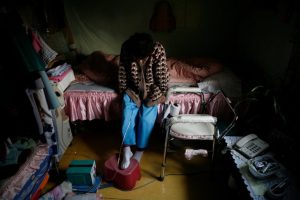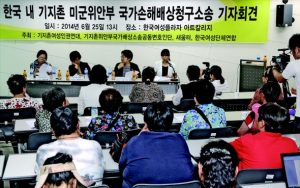1/22のTV「報道2001」でいろんな人がいろいろと言っていましたが、石平氏が一番的確と思って聞いていました。特にキッシンジャーとトランプの関係について「習・キッシンジャー会談の時に、トランプ・蔡電話会談をしたのは明らかにキッシンジャーの面子を潰すため」と話したのは、多分その通りでしょう。中国に「俺はキッシンジャーの言う通りにはならない」と言うのを見せつけたのでしょう。またキッシンジャーはヒラリーと同じく中国から多額の金を受け取っているというのも知っているのかも知れません。トランプがやろうとしているのは「変革者」の役割で、既存の仕組みを壊さないと「強いアメリカ」の復活はできないという事です。だからグローバリズムを推進してきて甘い汁を吸ってきた国際金融資本やメデイアが反発して米国民を煽動してデモに走らせているのではと思っています。
本記事を読みますと、米国は韓国を見捨てたというのが分かります。而も書いたのがNYTで、韓国人か韓国系米国人でしょう。「南京虐殺」のアパ事件と言い、今回の「朝鮮戦争後の60・70年代に、韓国政府が外貨獲得の為もあり、米国の命令により、慰安婦を集めて、逃げないよう監禁していた」記事(「南京虐殺」・「従軍慰安婦」の捏造と言うのは、日本では既に発表されていましたが、大事なのは英語で且つ日本人以外の人に書いて戴くのが良い)を日本政府と民間組織は最大限に活用してほしい。「韓国がやってきたことだから、当然日本もやって来ただろう」というのは中国の「南京虐殺」と同じ構図で、自分達の犯してきた罪を潔白な日本に押し付けようとする意図があります。目良浩一教授のGAHT USA CORP“The global alliance for historical truth ”も今回の報道や韓国の判決を利用できるのであれば利用してほしいと思います。今、GAHTは米国連邦最高裁で米国にある韓国の慰安婦像の撤去を求めて裁判を起こしていますので、「自分を棚に上げて、日本を糾弾するとは何事」と言う裁判官の心理になるのではと思われます。
Henry Scott Stokesの“Fallacies in the Allied Nations’ Historical Perception As Observed by a British Journalist”も活用していったらどうか。戦勝国、特にアメリカは嫌がるかもしれませんが。APAホテルはこの本も置けば良いのに。他のホテルもスコットの本を置けば良いのです。間違った歴史認識を持った外国人は素直な頭を持てば理解してくれるでしょう。また、中国政府の言いなりになる人の魔除けともなります。中国人は中共政府を信じているとは思えませんので、英語本だけでなく中国語版も誰か翻訳して出してほしい。反日教の信者たる韓国民を除けば、普通の理性を持っていれば理解できるはずです。その前に大部分の日本人に読んで貰い、「南京虐殺」も「従軍慰安婦」も中国のプロパガンダと言うのを理解してほしいです。日本語版が2013年に出版されていますので。『英国人記者が見た連合国戦勝史観の虚妄(祥伝社新書)』です。英語版(2016年出版)より日本語版の方が先に出た形です。
米国に居るガリガリ左翼のダデン教授にもNYTの記事を送りつけたい気がします。彼女の主張は現在の価値観で過去を断罪するもの。それであれば米国のインデイアン虐殺、黒人奴隷、植民地獲得、原爆投下を米国政府に謝罪させねばおかしな話。韓国の金に転んだとしか思えません。まあ、この裁判も北が裏で策動していて、保守派の朴正煕のイメージダウンを図り、娘の朴槿恵を追い落とし、保守派の一掃を狙い、北主導での統一を図るのが透けて見えますが。
朝日新聞は自分に都合が悪い主張は、中国同様、右翼や修正主義者のレッテルを貼ったりしてきました。今こそその欺瞞を打破するときです。トランプが大統領になり、世界が変わろうとするときこそ、日本も変わりうるチャンスだという事です。戦後70数年の敗戦国としての桎梏を解放するときです。幸い昨年末には真珠湾にて日米同盟の絆を確認できました。まず、ニュークリアシエアリングで核に慣れることから始めましょう。
なお、NYT記事について、今回は翻訳している時間がありませんでしたので、一部の訳のみです。
NYT記事
By CHOE SANG-HUNJAN. 20, 2017

A woman named Bae, seen in a photograph from 2008, once worked as a prostitute near an American military base in South Korea. Former prostitutes say that few of their fellow citizens knew how involved their government once was in the sex trade. CreditJean Chung for The International Herald Tribune
SEOUL, South Korea — In a landmark ruling, a South Korean court said on Friday that the government had broken the law during the 1960s and ’70s by detaining prostitutes who catered to American soldiers, and by forcing them to undergo treatment for venereal diseases.
Dozens of former prostitutes brought a lawsuit to press the government to admit that it had played a hand in creating and managing a vast network of prostitution in camp towns, called gijichon, where poor Korean women worked in bars and brothels frequented by American troops.
In the ruling by a three-judge panel of the Central District Court in Seoul, the women did not win that admission or the apology they sought.
Yet the ruling was still a victory: For the first time, the court said the government had illegally detained gijichon prostitutes for forced treatment for sexually transmitted disease, and ordered it to pay 57 plaintiffs the equivalent of $4,240 each in compensation for physical and psychological damage.
“This was a serious human rights violation that should never have happened and should never be repeated,” Judge Jeon Ji-won, speaking for the panel, said of the detention and forced treatment.
Judge Jeon said the prostitutes had been “comfort women for the United States military,” touching on one of the country’s most delicate historical issues by using the same euphemism for prostitutes the Japanese have applied to Korean and other women who were forced into sexual servitude by its soldiers during World War II.(これは正確な表現ではない。日本軍は性病管理はしたが、韓国のように女性を強制的に集め、監禁して強制的に売春させたことはない)
The plaintiffs had encouraged that comparison, arguing that it was hypocritical for South Korea to condemn Japan for its historical wrongdoings while not acknowledging its own role in ensuring that foreign soldiers had access to Korean prostitutes.
“They say we walked into gijichon on our own, but we were cheated by job-placement agencies and were held in debt to pimps,”(これは戦時中もこの通り遣られたのです。韓国人女衒に騙されたり、親が売ったのです) Park Young-ja, 62, one of the plaintiffs, said after the ruling on Friday. “I was only a teenager and I had to receive at least five G.I.s every day with no day off. When I ran away, they caught and beat me, raising my debt.”
She added, “There was no one speaking for us, and we were abandoned by the state.”(「我々は国に見捨てられた」と言ってますがその通りでしょう。)
The Justice Ministry, which represented the government in the lawsuit, did not immediately react to the ruling on Friday.
In the destitute years after the Korean War of 1950-53, the dollars that prostitutes in the camp towns earned were a valued source of hard currency in South Korea. Former prostitutes have testified that government officials had urged them to earn more, calling them “patriots.”
At the same time, the women said, the health authorities cracked down on prostitutes who tested positive for sexually transmitted diseases, less out of concern for the women than to protect American soldiers. Newspaper accounts and parliamentary documents from the time referred to the prostitutes as “comfort women.” The court said on Friday that some of the women had been sold into the camps through human trafficking, while others appeared to have chosen prostitution to make a living.
Scholars who have studied the issue have said that the South Korean government was motivated in part by fear that the American military, stationed in the country to provide a defense against North Korea, would leave.
The American military became involved in attempts to regulate the sex trade to minimize the spread of disease among soldiers, those scholars said. The United States military command in Seoul has said that it did not condone or support prostitution or human trafficking.
The South Korean government has never formally acknowledged involvement in the camp towns or taken responsibility for abuses there. The women kept quiet for decades, partly because the military governments that ruled South Korea until the late 1980s enforced silence about issues that could be seen as detrimental to the alliance with the United States.
In addition, South Korean society has an extremely negative view of prostitutes, especially ones who had been paid by foreign soldiers. Prostitution is and has always been illegal in South Korea.
In 2014, however, more than 120 former prostitutes filed a lawsuit demanding compensation and a government apology for their detention and forced treatment. Only 57 of the plaintiffs were awarded compensation on Friday, because the court said there was not enough evidence that the others had been detained illegally.
Kim Jin, a lawyer for the women, said the verdict on Friday was significant because it was the first official acknowledgment that women in the camp towns had been subjected to illegal treatment. But Ms. Kim said the women would appeal the ruling, seeking an official apology, greater compensation and a finding that the government was responsible for creating and running the camp towns.
“We are not doing this for a mere 5 million won,” a woman who declined to give her name shouted outside the courtroom, referring to the compensation in South Korean currency each woman would receive. “They told us to earn as many dollars as possible, and now they want us to keep our mouths shut.”
Shin Young-sook, an advocate for the women, welcomed the court’s use of the term “comfort women” to refer to the former prostitutes.
For decades, bars and brothels have lined the streets of neighborhoods around American bases in the country. But the former prostitutes involved in the lawsuit said that few of their fellow citizens knew how deeply their government had been involved in the sex trade in the camp towns in the past.
They say the government not only sponsored classes for them to learn basic English and etiquette, meant to help them sell themselves more effectively, but that the American military police and South Korean officials also regularly raided clubs looking for women who were thought to be spreading diseases.
They added that the police would then detain those women, locking them up in so-called monkey houses with barred windows. There, they said, the women were forced to take medications until they were well.
“They never sent us doctors even when we were so sick we almost died, except they treated us for venereal diseases,” Ms. Park said. “It’s clear that they treated our venereal diseases not for us but for the American soldiers.”
ハンギョレ記事
根拠のない性病感染者の強制収容は「違法行為」と判断 「被害者57人に49万円ずつ賠償」判決 「基地村の設置・管理が違法」との主張は認めず

| 朝鮮戦争は、韓国の女性たちにも癒えることのない傷を残した。米軍基地村女性122人は国に対し被害賠償請求訴訟を起こすことにした。2014年7月25日、ソウル大方洞のソウル女性プラザビル4階で開かれた訴訟記者会見の様子=カン・ジェフン先任記者//ハンギョレ新聞社 |
国が米軍基地村「慰安婦」被害者に対して損害賠償をすべきとする裁判所の判断が出た。裁判所は国家が性病の管理のため、彼女らを隔離施設に強制収容したのは違法だと判決した。
ソウル中央地裁民事22部(裁判長チョン・ジウォン)は20日、L氏など基地村「慰安婦」被害者120人が国に対して起こした損害賠償請求訴訟で、「国が被害者57人に対して500万ウォン(約49万円)を賠償せよ」とする原告一部勝訴判決を下した。
裁判所はまず、国が法的根拠もなく、性病に感染したり、感染者と疑われた被害者たちを「落検者収容所」に強制隔離収容して治療したのは、違法だと判示した。裁判所は「収容された慰安婦」たちは完治したと判定されるまで、収容所外に出られず、収容所から脱出を試みて負傷した場合もあったとみられる」と指摘した。また、「(治療の過程で)ペニシリンショックによる副作用に悩まされたり、死亡した被害者もいた」と述べた。
裁判所はまた、5年の消滅時効が完了したという国の主張も認めなかった。消滅時効は、一定期間権利を行使しなければその行使を制限する制度で、国は米軍「慰安婦」の国家賠償の消滅時効が終了したと主張してきた。しかし、裁判所は「権威主義統治時代と当時米軍慰安婦などに対して閉鎖的だった国民感情、男性中心的で家父長的に形成された社会文化などを考慮すれば、(被害者たちが)権利を放置したとは評価できない」と述べた。また、「国家権力機関の国民に対する不法収容など、過酷行為は決してあってはならない違法行為」だと判断した。隔離収容の対象となる伝染病を明示した施行規則が制定された1977年8月以前に隔離し収容された「慰安婦」被害者57人に対する国家の賠償責任が認められたのだ。
ただし裁判所は、「国が売買春が容易に行われるよう基地村を作ったのは違法」という被害者たちの主張は受け入れなかった。裁判所は「被害者たちが基地村内での売春を強いられたり、やめられないほどの状態にあったと見ることはできない」として、このように判断した。また、「政府が『浄化運動』などを展開して基地村の売買春を管理したのは違法行為」という主張に対しても、「このような指針は売買春関係者に対する性病検診・治療などの公益的目的を達成するためのものとみられる」との見解を示した。
ヒョン・ソウン記者(お問い合わせ japan@hani.co.kr)
良ければ下にあります
を応援クリックよろしくお願いします。

